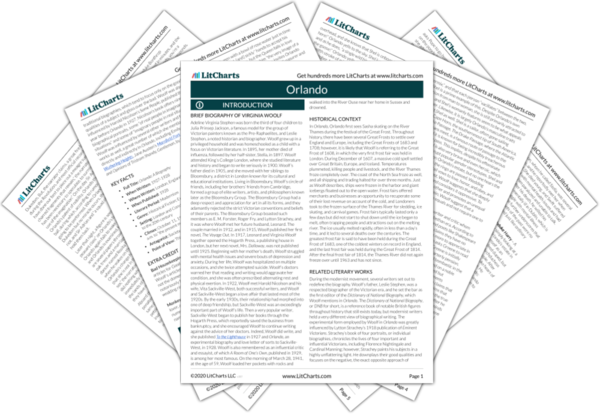Jonathan Swift Quotes in Orlando
It was happy for Orlando, though at first disappointing, that this should be so, for she now began to live much in the company of men of genius, yet after all they were not much different from other people. Addison, Pope, Swift, proved, she found, to be fond of tea. They liked arbours. They collected little bits of coloured glass. They adored grottoes. Rank was not distasteful to them. Praise was delightful. They wore plum-coloured suits one day and grey another. Mr. Swift had a fine malacca cane. Mr. Addison scented his handkerchiefs. Mr. Pope suffered with his head. A piece of gossip did not come amiss. Nor were they without their jealousies. (We are jotting down a few reflections that came to Orlando higgledy-piggledy.) At first, she was annoyed with herself for noticing such trifles, and kept a book in which to write down their memorable sayings, but the page remained empty.

Unlock explanations and citation info for this and every other Orlando quote.
Plus so much more...
Get LitCharts A+
Jonathan Swift Quotes in Orlando
It was happy for Orlando, though at first disappointing, that this should be so, for she now began to live much in the company of men of genius, yet after all they were not much different from other people. Addison, Pope, Swift, proved, she found, to be fond of tea. They liked arbours. They collected little bits of coloured glass. They adored grottoes. Rank was not distasteful to them. Praise was delightful. They wore plum-coloured suits one day and grey another. Mr. Swift had a fine malacca cane. Mr. Addison scented his handkerchiefs. Mr. Pope suffered with his head. A piece of gossip did not come amiss. Nor were they without their jealousies. (We are jotting down a few reflections that came to Orlando higgledy-piggledy.) At first, she was annoyed with herself for noticing such trifles, and kept a book in which to write down their memorable sayings, but the page remained empty.

Unlock explanations and citation info for this and every other Orlando quote.
Plus so much more...
Get LitCharts A+








